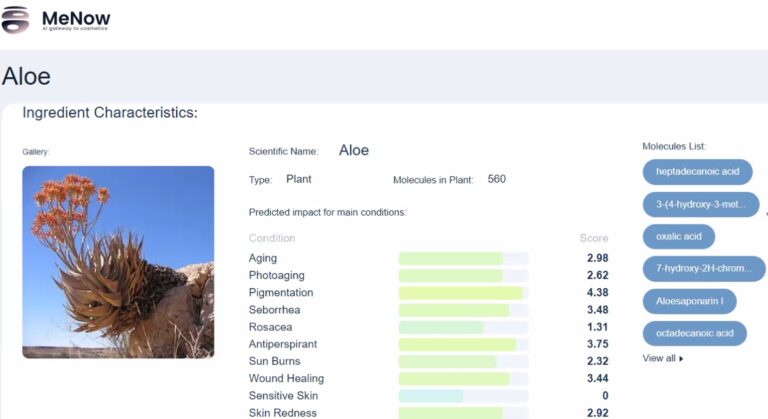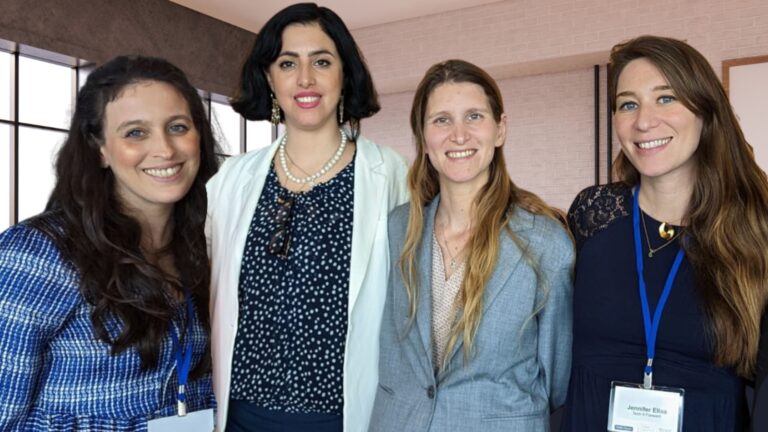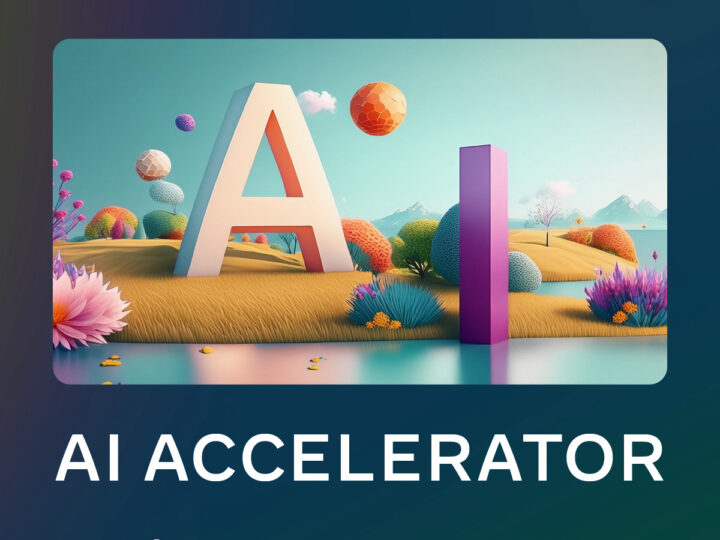Ever hear of bakuchiol?
Neither did I, until a new personalized recommendation engine for skincare products pinpointed this plant-derived retinol alternative as an ingredient I should look for.
MeNow, launched nearly two ago by two female Israeli scientists, is based on the understanding that skin is highly individual and reacts differently to specific ingredients depending on biological and environmental variables.
The brand or price of a product, or the fact that your best friend swears by it, doesn’t guarantee compatibility with your skin. Nor do claims of being hypoallergenic, all-natural, or formulated for a certain skin type.
“When it comes to choosing soaps, sunscreen or face cream, you’re asked if you have oily or dry skin and that’s it. Nobody really knows how it will interact with their own skin. There’s a real need to take into account the biology of the person,” MeNow CTO Coralie Ebert tells ISRAEL21c.
Ebert and cofounder Hilla Arbel met while working for a pharma startup. Ebert has a master’s in bioinformatics and a PhD in computational science. Arbel has a PhD in biotechnology engineering.
Their combined expertise and personal experiences with skincare products convinced them that they could solve a pain point for both manufacturers and consumers.
MeNow’s SaaS (software as a service) Search MeNow platform applies artificial intelligence and chemo-informatics to the process of formulating targeted products and its AI Ask MeNow assistant helps customers choose the right ones for their skin.
It’s a simple equation: Providing and matching each consumer with products that maximize results and minimize unwanted side effects leads to customer satisfaction and repeat sales.
Like chicken soup
MeNow gathered data from multiple sources on tens of thousands of cosmetic and skincare ingredients across the world – including bakuchiol, which originates in Tibet.
Analyzing each molecule of those ingredients with a proprietary algorithm yielded millions of data points that help predict how the substance will interact with the skin of a specific individual.
“There is not enough research on how each ingredient affects people,” says Arbel.
“We can help clients develop products that fit the target better, and when they sell their products we help them with personalization based on the chemistry of the product and the biology of the buyer.”
She points out that everyone knows chicken soup has healing properties but we don’t understand them on the molecular level. It’s the same for botanicals used in cosmetics and skin care.
“One plant has, say, 50 molecules and each one has to be isolated and tested in the lab to find what is good and what isn’t. It’s very tedious and difficult to analyze the molecular structure and check it for different indications. We do this digitally, rather than in a lab, so we can provide the answer simply and quickly.”
Manufacturers can use MeNow to learn more about a particular ingredient. For example, the company’s database shows that aloe vera has 560 molecules and lists its predicted impact for a variety of indications as well as its trending uses and synonyms such as “burn plant.”

The company’s AI assistant for ecommerce sites asks customers questions about age, skin issues, smoking, frequency of makeup use, hours spent in the sun, skin shade and more.
Ask MeNow determined that the best ingredients for my facial care are argan oil, bakuchiol, calendula and hyaluronic acid, and explained the advantageous characteristics of each one.
Those who complete this questionnaire might get a discount coupon as an incentive to buy one of the partner retailer’s products containing one or more of the recommended ingredients.
If the retailer doesn’t have a matching product, the customer may have to look elsewhere, but MeNow’s AI system will help the retailer develop new products to better meet customers’ needs.
Shortening development time
ISRAEL21c learned of MeNow from Tel Aviv-based Tech It Forward, an agency that scouts out promising startups and connects them to international partners, investors and corporations.
Cofounder Jennifer Elias says Tech it Forward discovered MeNow when it was still in stealth mode, and considers it to be “a true gem of Israel’s tech industry.”
“Since then, MeNow has participated in our scouting program for [Brazilian cosmetics multinational] Natura, and pitched at our prestigious Cartier Women’s Initiative event together with other investors that we hosted here in Israel,” Elias tells ISRAEL21c. “Through these opportunities, MeNow has gained visibility and potential for funding and collaboration.”

In January, Tel Aviv-based Green Mountain Biotech and MeNow embarked on an ambitious project to identify new combinations of Chinese medicinal herbs that Green Mountain can develop into raw ingredients for the cosmetic and personal-care industries targeting specific skin conditions.
Yonit Bomstein, Green Mountain’s chief technology innovation officer and head of R&D, tells ISRAEL21c that while the results from MeNow must still be validated, the AI analysis process was “much faster than we if we did it by ourselves.”
Shortening the development time for botanical treatments is exactly what she is after.
“We look for synergistic herbal combinations and ratios to give the maximum therapeutic effect. Usually it’s quite a long process involving biological assays that correlate to skin conditions,” Bomstein explains.
“The information MeNow provides can help us optimize the extraction process to get higher efficacy, with less time and expense.”
Algorithm of ancient beauty
The buzz generated by the Green Mountain project led Personal Care Insights to dub MeNow “the algorithm of ancient beauty.”
Additional companies have requested proofs of concept, and MeNow signed contracts with Israeli cosmetic brands FRÉ and Kamedis for a personalized recommendation system on their websites, Arbel told ISRAEL21c shortly before she and Ebert went to demonstrate MeNow’s software at the In-Cosmetics trade show in Barcelona.
Based in Rehovot, MeNow has seven employees and several interns, some from the nearby Weizmann Institute of Science and others working virtually from New York and from France, Ebert’s native country. The startup is mainly bootstrapped, with additional funding from angel investors and the Israel Innovation Authority.
For more information, click here.

















